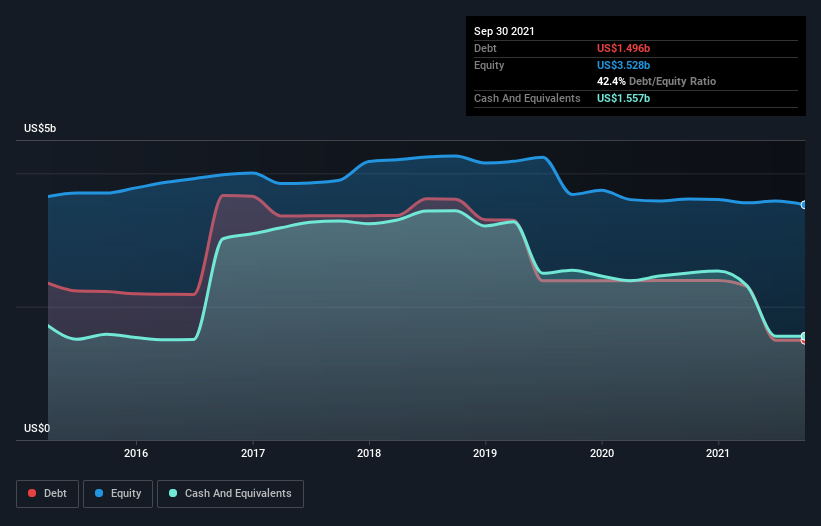
David Iben put it well when he said, 'Volatility is not a risk we care about. What we care about is avoiding the permanent loss of capital.' It's only natural to consider a company's balance sheet when you examine how risky it is, since debt is often involved when a business collapses. Importantly, EchoStar Corporation (NASDAQ:SATS) does carry debt. But is this debt a concern to shareholders?
When Is Debt Dangerous?
Debt assists a business until the business has trouble paying it off, either with new capital or with free cash flow. Ultimately, if the company can't fulfill its legal obligations to repay debt, shareholders could walk away with nothing. While that is not too common, we often do see indebted companies permanently diluting shareholders because lenders force them to raise capital at a distressed price. Of course, the upside of debt is that it often represents cheap capital, especially when it replaces dilution in a company with the ability to reinvest at high rates of return. When we think about a company's use of debt, we first look at cash and debt together.
See our latest analysis for EchoStar
What Is EchoStar's Debt?
You can click the graphic below for the historical numbers, but it shows that EchoStar had US$1.50b of debt in September 2021, down from US$2.39b, one year before. However, its balance sheet shows it holds US$1.56b in cash, so it actually has US$60.9m net cash.

A Look At EchoStar's Liabilities
Zooming in on the latest balance sheet data, we can see that EchoStar had liabilities of US$487.3m due within 12 months and liabilities of US$2.17b due beyond that. Offsetting this, it had US$1.56b in cash and US$208.8m in receivables that were due within 12 months. So its liabilities total US$888.4m more than the combination of its cash and short-term receivables.
This deficit isn't so bad because EchoStar is worth US$2.21b, and thus could probably raise enough capital to shore up its balance sheet, if the need arose. But it's clear that we should definitely closely examine whether it can manage its debt without dilution. While it does have liabilities worth noting, EchoStar also has more cash than debt, so we're pretty confident it can manage its debt safely.
It is well worth noting that EchoStar's EBIT shot up like bamboo after rain, gaining 98% in the last twelve months. That'll make it easier to manage its debt. When analysing debt levels, the balance sheet is the obvious place to start. But it is future earnings, more than anything, that will determine EchoStar's ability to maintain a healthy balance sheet going forward. So if you're focused on the future you can check out this free report showing analyst profit forecasts.
Finally, a company can only pay off debt with cold hard cash, not accounting profits. While EchoStar has net cash on its balance sheet, it's still worth taking a look at its ability to convert earnings before interest and tax (EBIT) to free cash flow, to help us understand how quickly it is building (or eroding) that cash balance. During the last three years, EchoStar generated free cash flow amounting to a very robust 84% of its EBIT, more than we'd expect. That puts it in a very strong position to pay down debt.
Summing up
While EchoStar does have more liabilities than liquid assets, it also has net cash of US$60.9m. And it impressed us with free cash flow of US$95m, being 84% of its EBIT. So we are not troubled with EchoStar's debt use. When analysing debt levels, the balance sheet is the obvious place to start. But ultimately, every company can contain risks that exist outside of the balance sheet. For example EchoStar has 2 warning signs (and 1 which can't be ignored) we think you should know about.
Of course, if you're the type of investor who prefers buying stocks without the burden of debt, then don't hesitate to discover our exclusive list of net cash growth stocks, today.
Valuation is complex, but we're here to simplify it.
Discover if EchoStar might be undervalued or overvalued with our detailed analysis, featuring fair value estimates, potential risks, dividends, insider trades, and its financial condition.
Access Free AnalysisHave feedback on this article? Concerned about the content? Get in touch with us directly. Alternatively, email editorial-team (at) simplywallst.com.
This article by Simply Wall St is general in nature. We provide commentary based on historical data and analyst forecasts only using an unbiased methodology and our articles are not intended to be financial advice. It does not constitute a recommendation to buy or sell any stock, and does not take account of your objectives, or your financial situation. We aim to bring you long-term focused analysis driven by fundamental data. Note that our analysis may not factor in the latest price-sensitive company announcements or qualitative material. Simply Wall St has no position in any stocks mentioned.
About NasdaqGS:SATS
EchoStar
Provides networking technologies and services in the United States and internationally.
Fair value with worrying balance sheet.


